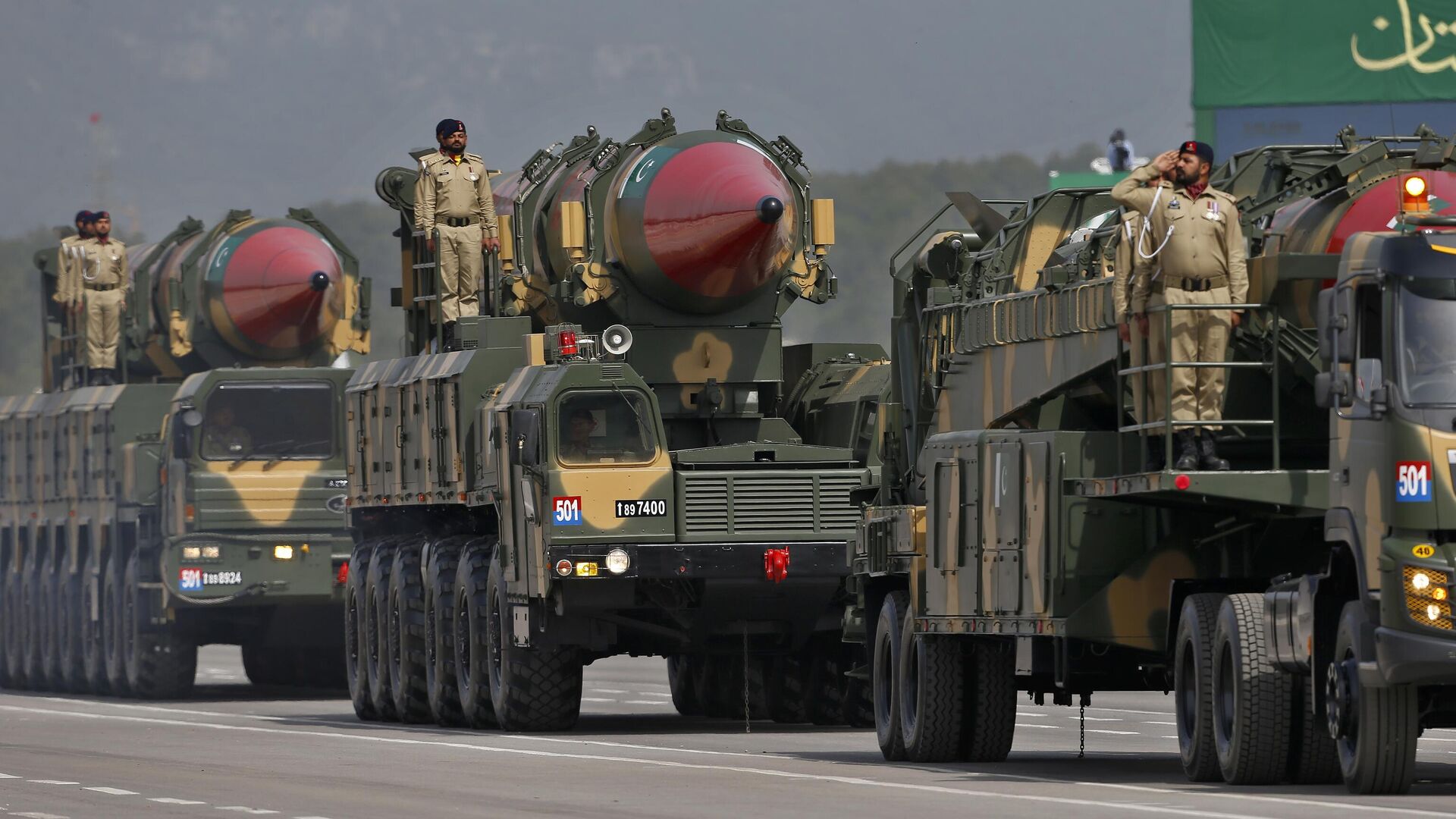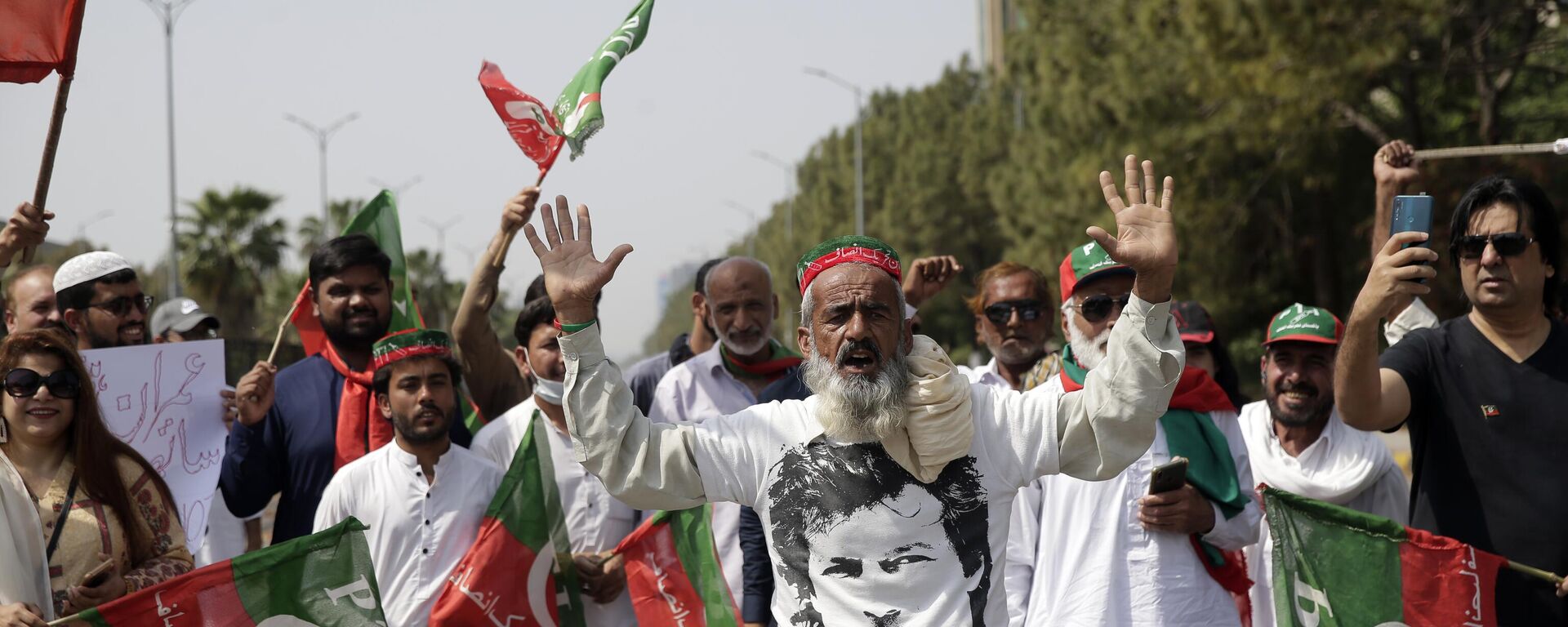https://sputniknews.in/20240308/pakistans-rising-military-strength-a-closer-look-at-its-military-doctrine-6759790.html
Pakistan's Rising Military Strength: A Closer Look at Its Military Doctrine
Pakistan's Rising Military Strength: A Closer Look at Its Military Doctrine
Sputnik India
In the race for military might, the Pakistan Army has rapidly ascended to become a significant global force, currently holding 7th position in the Military... 08.03.2024, Sputnik India
2024-03-08T16:52+0530
2024-03-08T16:52+0530
2024-03-08T16:54+0530
terrorism
pakistan
india
iran
the united nations (un)
sputnik opinion
https://cdn1.img.sputniknews.in/img/07e7/03/10/1193696_0:160:3073:1888_1920x0_80_0_0_b3115dab8c839d083578307d670e96ff.jpg
Despite confronting various socio-political and economic challenges, Pakistan has successfully established itself as a formidable military power on the global stage. Over the past three years, the Pakistan Army has notably advanced in rankings, progressing from 15th place in 2020 to its current 7th position three years later, as per Global Firepower’s 2023 report.As part of the ranking, countries receive a 'Power Index' score, with a lower value indicating higher combat readiness. With a commendable Power Index of 0.1694, Pakistan has outperformed several prominent powers, including Japan, France, Italy, Turkiye, Brazil, Iran, Israel, Saudi Arabia, Germany, and Canada.Military Capability of the Islamic RepublicPakistan's rise in this year's rankings was due to strategic geographical positioning, supported by its 3,700 tanks, 1,400 military aircraft, nine submarines, and 654,000 active military personnel as of January 2023. In one such example, Pakistan recently carried out a joint venture with NORINCO China & various Pakistani defense industries to show Haider Main Battle Tank.Pakistan shares borders with Afghanistan, India, China, and Iran, placing it in a region of significant geopolitical tension and arms race. Global Firepower highlighted, despite being the only Islamic nuclear nation, Pakistan's rankings in key areas such as total available manpower for military service, active military personnel, and aircraft fleet strength gave it a Power Index score of 0.1694.He added, "It has strong defense production capability and has a number of joint ventures with friendly nations. Keeping in sync with modern times it has developed a strong cyber defense. It is also incrementally increasing its space and satellite capabilities. Pakistan places a premium on solid military training."Pakistan is now providing advanced military equipment to countries in Central Asia.Pakistan’s Military DoctrinePakistan confronts complex security bottlenecks stemming from historical conflicts with India, a nuclear-armed military powerhouse. The ongoing tensions are fueled by both nations' advanced military capabilities, raising fears of future conflicts. On this, Pakistan's military doctrine varies from its Indian equivalent.He further added, "Pakistan's military doctrine is well-crafted, shaped by its rivalry with India. It focuses on nuclear deterrence, asymmetric warfare, missile technology, and cyber capabilities for national security. The strategy balances military strength with diplomacy and alliances to address security challenges effectively."The Pakistani military's defensive doctrine focuses on enhancing its strength to counter potential threats and Indian regional military hegemony especially. Owing to lingering on regional conflicts and territorial disputes, over time, Pakistan has traditionally prioritized security needs to establish itself as a dominant military power, leading to military dominance in shaping domestic and foreign policies.
https://sputniknews.in/20240301/ptis-nationwide-protest-against-alleged-election-fraud-what-is-behind-it-6697584.html
pakistan
india
iran
Sputnik India
feedback.hindi@sputniknews.com
+74956456601
MIA „Rossiya Segodnya“
2024
Muhammad Sharif
https://cdn1.img.sputniknews.in/img/07e7/0b/05/5257054_0:0:443:444_100x100_80_0_0_b8bd2af32be62a6eecdb4a84c7fd978f.jpg
Muhammad Sharif
https://cdn1.img.sputniknews.in/img/07e7/0b/05/5257054_0:0:443:444_100x100_80_0_0_b8bd2af32be62a6eecdb4a84c7fd978f.jpg
News
en_IN
Sputnik India
feedback.hindi@sputniknews.com
+74956456601
MIA „Rossiya Segodnya“
Sputnik India
feedback.hindi@sputniknews.com
+74956456601
MIA „Rossiya Segodnya“
Muhammad Sharif
https://cdn1.img.sputniknews.in/img/07e7/0b/05/5257054_0:0:443:444_100x100_80_0_0_b8bd2af32be62a6eecdb4a84c7fd978f.jpg
terrorism, pakistan, india, iran, the united nations (un)
terrorism, pakistan, india, iran, the united nations (un)
Pakistan's Rising Military Strength: A Closer Look at Its Military Doctrine
16:52 08.03.2024 (Updated: 16:54 08.03.2024) In the race for military might, the Pakistan Army has rapidly ascended to become a significant global force, currently holding 7th position in the Military Strength Rankings of 2023.
Despite confronting various socio-political and economic challenges, Pakistan has successfully established itself as a formidable military power on the global stage.
Over the past three years, the Pakistan Army has notably advanced in rankings, progressing from 15th place in 2020 to its current 7th position three years later, as per Global Firepower’s 2023 report.
As part of the ranking, countries receive a 'Power Index' score, with a lower value indicating higher combat readiness. With a commendable Power Index of 0.1694, Pakistan has outperformed several prominent powers, including Japan, France, Italy, Turkiye, Brazil, Iran, Israel, Saudi Arabia, Germany, and Canada.
"Pakistan's military capabilities have advanced due to substantial investments in modernization efforts, emphasizing nuclear development, missile technology, and cyber warfare capabilities. These measures serve to uphold the regional security equilibrium, especially with India, and bolster Pakistan's stature internationally," a geopolitical analyst and associate with the Institute of Strategic Studies in Islamabad, Muhammad Taimur Fahad Khan, told Sputnik.
Military Capability of the Islamic Republic
Pakistan's rise in this year's rankings was due to strategic geographical positioning, supported by its 3,700 tanks, 1,400 military aircraft, nine submarines, and 654,000 active military personnel as of January 2023.
In one such example, Pakistan recently carried out a joint venture with NORINCO China & various Pakistani defense industries to show Haider Main Battle Tank.
Pakistan shares borders with Afghanistan, India, China, and Iran, placing it in a
region of significant geopolitical tension and arms race. Global Firepower highlighted, despite being the only Islamic nuclear nation, Pakistan's rankings in key areas such as total available manpower for military service, active military personnel, and aircraft fleet strength gave it a Power Index score of 0.1694.
"Given its challenging surroundings, Pakistan must maintain credible conventional and nuclear deterrence. The country has effectively upheld strategic stability in South Asia through its robust military capabilities, encompassing both nuclear and conventional forces. In recent decades, the Pakistani Army has acquired valuable expertise in combating terrorism, conducting counter-insurgency operations, and participating in UN peacekeeping missions," Dr. Tughral Yamin, a foreign affairs analyst and political expert, told Sputnik.
He added, "It has strong defense production capability and has a number of joint ventures with friendly nations. Keeping in sync with modern times it has developed a strong cyber defense. It is also incrementally increasing its space and satellite capabilities. Pakistan places a premium on solid military training."
Pakistan is now providing advanced military equipment to countries in
Central Asia.
"Pakistan cannot keep its guard down because it is beset both by external and internal threats. Operation Swift Retort four years ago is just an example of it dealing successfully with Indian bombing inside its territory. Pakistan is investing in cutting-edge technology to build up its surveillance and communication capability. It has acquired the latest drones from China and Turkiye," Dr Yamin unveiled to Sputnik India.
Pakistan’s Military Doctrine
Pakistan confronts complex security bottlenecks stemming from historical conflicts with India, a nuclear-armed military powerhouse. The ongoing tensions are fueled by both nations' advanced military capabilities, raising fears of future conflicts. On this, Pakistan's military doctrine varies from its Indian equivalent.
"Pakistan's military doctrine has evolved significantly in response to historical conflicts and ongoing tensions with neighboring countries, particularly India. This adaptation is centered around several key strategies to ensure national security and regional stability, namely, nuclear deterrence, asymmetric warfare, strategic partnerships, border security and counter-terrorism, indigenous military production and conventional force modernization. These strategies reflect Pakistan's adaptive approach to maintaining national security and regional stability amid evolving security challenges and complex geopolitical dynamics," Khan, told Sputnik.
He further added, "Pakistan's military doctrine is well-crafted, shaped by its rivalry with India. It focuses on nuclear deterrence, asymmetric warfare, missile technology, and cyber capabilities for national security. The strategy balances military strength with diplomacy and alliances to address security challenges effectively."
The Pakistani military's defensive doctrine focuses on enhancing its strength to counter potential threats and Indian regional military hegemony especially. Owing to lingering on regional conflicts and territorial disputes, over time, Pakistan has traditionally prioritized security needs to establish itself as a dominant military power, leading to military dominance in shaping domestic and foreign policies.



